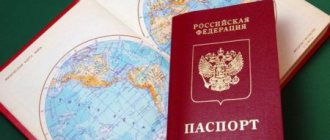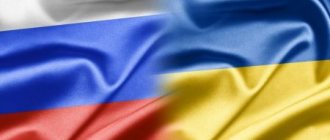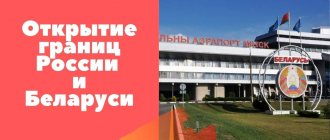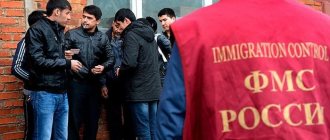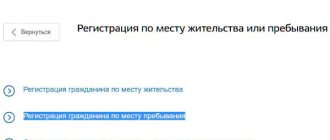general information
The Republic of Kazakhstan is one of the most prosperous countries in Central Asia. Perhaps this state, possessing huge oil reserves, access to the Caspian Sea, a cosmodrome, vast free territories and expensive minerals, turned out to be the only one in this region where the “color revolution” did not take place.
This is a multinational republic in which a huge number of people live. Today, not only Kazakhs and Russians live on the territory of Kazakhstan, but also Ukrainians, Belarusians, Greeks, Turks, Georgians, Armenians, Uighurs, Chinese, Germans and representatives of other nationalities.
Detailed map of Kazakhstan showing highways, cities and national parks
Thus, according to the population census conducted in 2021, today the following people live in Kazakhstan:
- Kazakhs – 11,245 people.
- Russians – 3,685 people.
- Uzbeks – 521 people.
- Ukrainians – 301 people.
- Uyghurs – 247 people.
- Tatars – 203 people.
- Germans – 182 people.
Natural process
Many people, especially members of the older generation, longingly remember the times when all the now former Soviet republics lived as one family. Needless to say, some patriots of the USSR still perceive with resentment the fact that some Baltic republics accepted their independence with great joy. But Kazakhstan is not the Baltic states. There is a completely different mentality here. If we do not take into account the opinions of Kazakh nationalists and other “right-wingers,” the young republic reacted calmly, almost philosophically, to gaining independence.
It is important to understand that in the eighties of the twentieth century the percentage of the Kazakh population was small - only about forty percent.
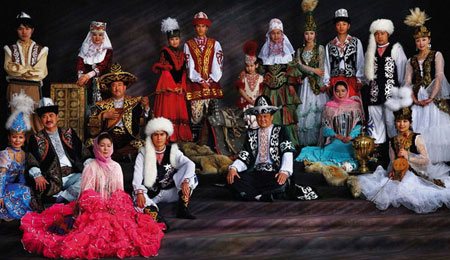
National Kazakh costumes
In 2003, after the program for the voluntary resettlement of oralmans to Kazakhstan began, the share of Kazakhs out of the total population exceeded 50 percent. This figure is constantly growing. This is especially felt in the large southern cities of Kazakhstan.
The same applies to the “brainchild” of N.A. Nazarbayev - Nur-Sultan (Astana). This city, which just fifteen years ago looked like an abandoned farm, today is a toy city that can rival even European capitals in beauty and modernity.
Today, according to statistics, 74% of Kazakhs, 16% of Russians and 7.8% of representatives of other nationalities live in Nur-Sultan.
The situation is approximately the same in the southern capital of the Republic - Almaty (formerly Alma-Ata). Today, in this million-plus city, which is rightfully considered the cultural center of Kazakhstan, 56.11% of Kazakhs and 29.67% of Russians live. The question of why Russians want to leave Kazakhstan for Russia for permanent residence worries sociologists of the Republic.
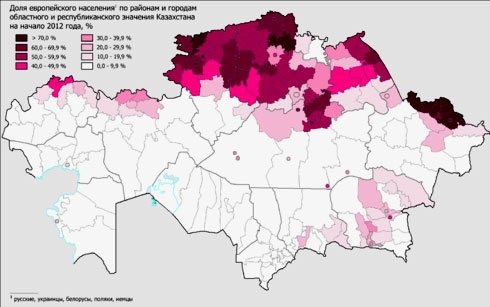
Map of the distribution of the Russian population on the territory of Kazakhstan
According to many of them, the fact that Russians are leaving Kazakhstan almost en masse is a very alarming indicator. “Fish looks for where it is deeper, but man looks for where it is better,” says a popular proverb. It is quite difficult to answer the question why Russians, who have taken deep roots in Kazakhstan, are leaving the young republic.
Obviously, the main reason is ethnic heterogeneity. The so-called oralmans are returning to Kazakhstan - ethnic Kazakhs or Kazakhstanis who, at the time Kazakhstan gained independence, did not have citizenship and now, according to the president’s program, have returned to their homeland for permanent residence. Against this background, representatives of national minorities strive to leave for their historical homeland and join their own cultural layer.
Other reasons
Other reasons why Russians leave include:
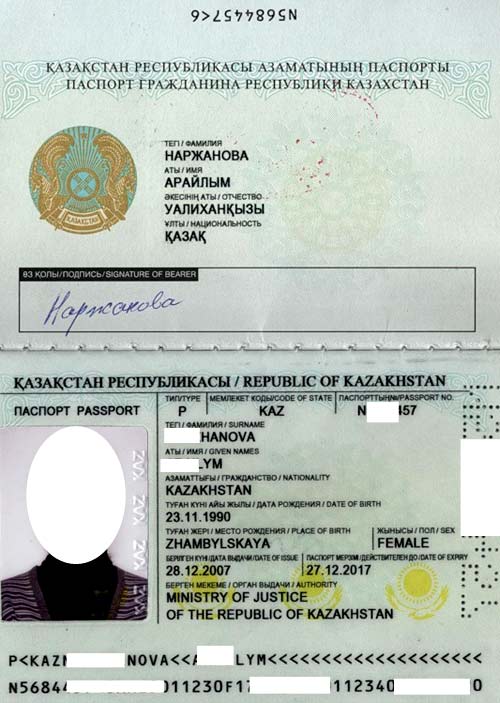
This is what a passport of a citizen of Kazakhstan looks like
- competition when applying for a job in Kazakhstan (this is also due to the ethnic factor);
- the language barrier;
- significant limitation of the Russian language.
There are two official languages in Kazakhstan: Kazakh and Russian. Office work, according to existing legislation, is conducted in two languages. Despite this, it is quite difficult for Russian-speaking graduates to get a job, since if the head of the enterprise is a representative of Kazakh nationality, then preference will be given to “our own people.”
In Almaty, where there are a huge number of foreign companies on the market, this is not yet so noticeable. But in small southern cities like Taldykorgan (formerly the village of Gavrilovka) the situation is critical. This is especially true for civil servants. The situation is complicated by the fact that at the official level there is nothing to complain about: in addition to the fact that office work is conducted in two languages, meetings and “planning meetings” are held mainly in Russian.
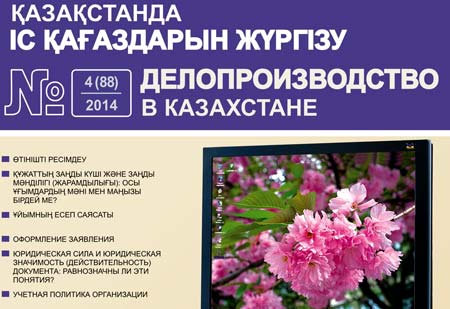
Russians are definitely being “squeezed out” from the team. Gradually, slowly and very patiently. The point, again, is in the mentality formed over many centuries.
If in the Baltic republics they prefer to directly point out that “non-citizens” have nothing to do in the state structure, then in Kazakhstan they act cautiously, with oriental cunning: the Russian will not stand it, he will leave. The leader will only have to shrug his shoulders and, having washed his hands of it, take one of the returning oralmans in his place.
Historical factor
Several decades ago, in history lessons in schools, the issue described in the novel “The Messenger” by the remarkable Soviet writer of Kazakh origin Anuar Alimzhanov was studied in detail. This question concerns the annexation, at the request of Khan Abulkhair, of the not yet fully formed Kazakh Khanate to the Russian Empire. Today, the common glorious past is often presented in a negative way.
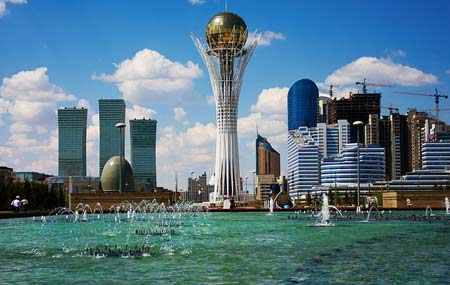
View of the new business center in the capital of Kazakhstan
Young Kazakhs are convinced that the Russian Empire “came, saw, won” and “under the guise” created by the fleeing Mongol army, annexed Kazakhstan, which wanted independence. The Russian people, who played an important role in the expulsion of the Mongols and Dzungars, who committed genocide on Kazakh lands, look like invaders and occupiers in modern history textbooks. How dangerous such trends are can be judged by the military events in Ukraine.
The recent renaming of streets also played some role. Of course, this reason cannot be called one of the answers to the question of why Russians are leaving - the fact of the renaming simply added fuel to the fire. It is impossible not to note a funny fact: with the renaming of streets, an awkward confusion began. This especially affected the transport sector.
Not everything is rosy in the cultural sphere either. In Kazakhstan, especially in Almaty, there is a real problem with the creative self-expression of modern writers.
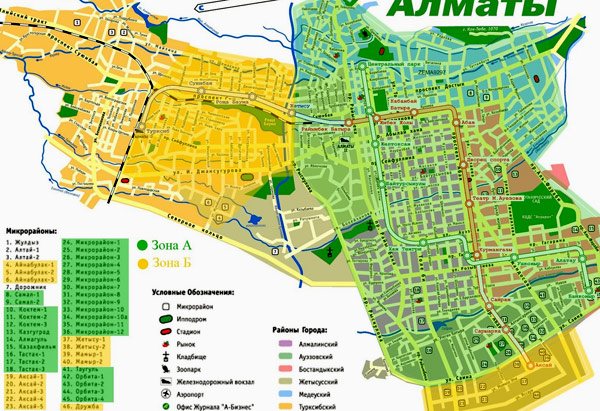
Detailed map of Almaty indicating districts and blocks
Many of them are published in Russia. Several years ago, a law was passed according to which all films, except those created by Russian film studios, will be dubbed exclusively into the Kazakh language. After even a significant part of the Kazakh youth became indignant, the solution to this issue was postponed.
National question
There seem to be no nationalists in Kazakhstan. Of course, the Kazakhs do not have such bright ideological inspirers as the notorious Bandera and Shukhevych. But in the Kazakh parliament there is a “right” faction, which is gaining more and more supporters every year.
At the everyday level, everything is quite complicated. In general, relations between Kazakhs and Russians cannot be called tense. Close friendships were formed against the backdrop of studying, working and living together in the same neighborhood. There are many mixed families in which both Kazakh and Russian traditions are equally revered.
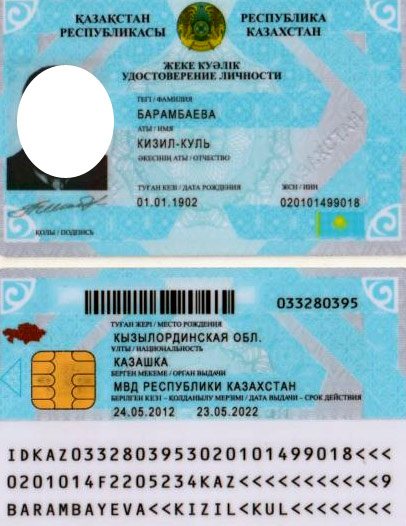
Example of an ID card in Kazakhstan
In general, Kazakhs “dislike” Tatars and Uyghurs to a greater extent. They have quite tense relations with the Chinese and representatives of Chechen nationality. Large cities are often divided into districts that are “controlled” by various nationalist groups. Several years ago in Almaty there was a case of serious conflict between Chechen and Kazakh groups.
At the everyday level, some tension is expressed in much the same way as in the case of government agencies. Russian-speaking citizens of Kazakhstan who speak Kazakh have more than once heard not very pleasant things said about them in an impersonal manner on public transport. A few years ago, a real resonance was caused by an inscription on the wall of a house in one small East Kazakhstan city. The inscription, written in a rude and categorical form, said that the Russians must immediately leave Kazakhstan.
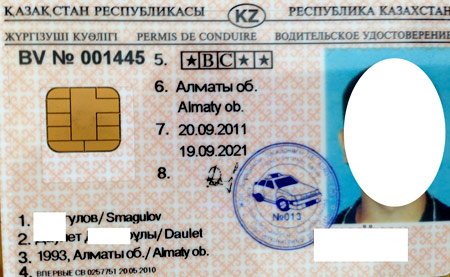
This is what a Kazakh driver's license looks like
There is also a reverse reaction. So, in Almaty in 2009-2010 there was a youth group of skinheads. Shaven-headed Russian-speaking guys aged 16-20 attacked their fellow citizens solely for national reasons.
The gradual displacement of the Russian language also plays an important role. This fact is perhaps the main answer to the question of why Russians leave, preferring the difficulties of migration to an established life in Kazakhstan. When the “language issue” was raised in Kazakhstan, one respected person hesitated and replied that many Kazakhs have a genetic dislike for the Russian language. And this is explained by the forced Russification of the Kazakhs, which took place at the dawn of the twentieth century.
Who can participate in the program?
The program is available to return compatriots to their homeland. Such persons include citizens of foreign countries, as well as people who do not have a specific citizenship. An interesting fact is that those people who are currently in Russia, but with a temporary residence permit, can also take part in this event. This will make it easier to obtain citizenship.
Related news:
- Disability pension and daily allowance in 2021
- Teacher certification in 2021
- Revolution in Russia in 2021 - is it possible?
- Tax holidays in 2021 in Russia
- Where to invest money in 2021 in Russia?
- Conditions of the Zemsky Doctor program in 2021
Speaking about more specific requirements, it is worth saying here that the resettlement program to Russia from Kazakhstan 2020-2021 determines the requirements of who can take part in resettlement:
- adult citizen;
- capable person;
- knowledge of the Russian language is required, and you need to not only speak, but also write in it;
- a person with no criminal record.
Where do people leave Kazakhstan?
Modern Kazakh sociologists are tormented by the question not only of “why”, but also of “where”.
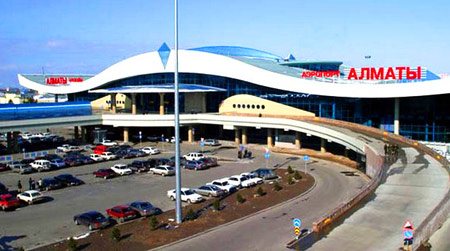
Airport building in Almaty
And if the “why” is more or less clear, then the geographic preferences of Russian-speaking citizens who have decided to emigrate from Kazakhstan are increasingly confusing. Of course, most Russians leave for Russia, Ukraine or Belarus. This is not difficult to explain, since some emigrants have relatives living there, while others have contract work. Where are the others going? The question is largely rhetorical. Where the heart calls.
At the dawn of the nineties, many people left for Germany and Israel. Some Russian speakers, unable to find employment for themselves either in Kazakhstan or in Russia, chose to leave for the United States. Many people still go to the UK and Canada. But the Scandinavian and Baltic countries are not very popular among emigrants from Kazakhstan.
Which regions are participating in the program?
Before becoming a participant, meaning official, of the program, you must determine the region for your move.
The choice of region has a number of features. Usually the applicant can choose a place independently, but it is necessary to take into account the fact that each location has its own quota for accepting compatriots. It is expressed as a percentage, there are regions where moving to will be much simpler and easier, so you need to pay attention to this. The easiest way is to settle in the least populated places and cities where there are some demographic problems or additional labor is required, that is, migrants are immediately provided with work and the state program for resettlement to Russia from Kazakhstan for 2021 does not contain any changes in this regard.
Resettlement program
There was a lot of talk about this program at the very beginning of the 2000s, but it started only in 2007, and by 2009 it had gained momentum. Today the Russian government says that the program will be extended again.
The program for resettling compatriots in Russia is designed not only for Russians. According to its rules, representatives of any nationality can change their living conditions to more acceptable ones.
By the way, the rules of the program must be studied more than carefully, since anyone who expects to leave Shymkent for Moscow and sit on the neck of the state will be severely disappointed. The main points of the resettlement program are:
- region;
- Job;
- housing;
- citizenship.
Each of these points has its own pitfalls.
Region
It is important to consider that the program does not include Moscow, St. Petersburg and the corresponding regions.
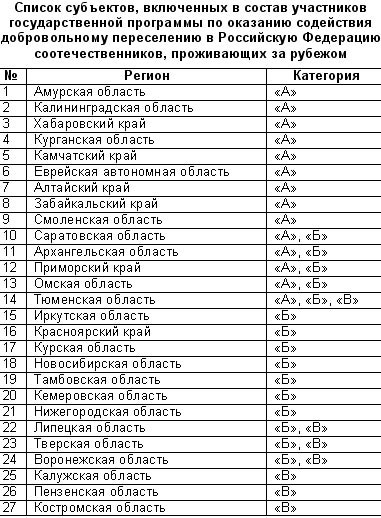
Most often, Russian “oralmans” are resettled to the following regions of the Russian Federation:
- Amur region.
- Kaliningrad region.
- Kamchatka Krai.
- Tambov Region.
- Krasnodar region.
- Voronezh region.
- Kostroma region.
- Penza region.
- Novosibirsk region.
Often the opportunity to end up in a village chills Russian Kazakhs and forces them to abandon the program and look for other ways to solve the problem.
Job
The Embassy of the Russian Federation honestly warns migrants that not everyone can count on unemployment benefits. Therefore, people who leave Kazakhstan are recommended to initially choose a region where an independent job search would not take long.
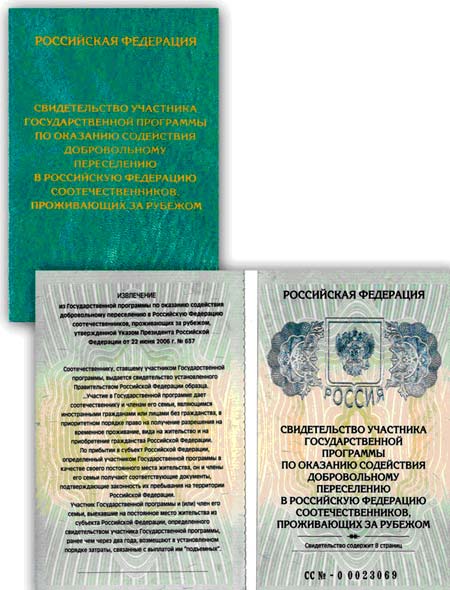
This is what a resettlement program participant’s ID looks like
Many people prefer to go to where relatives live who can provide shelter for the first time and help financially.
The program provides that all regions provide work to migrants, and there should be no problems finding it. It is important to understand that the salary will not be high, and the vacancies cannot be called enviable. There is an opportunity to get a job in a rather scarce specialty. Thus, in the regions, professionals in the educational sphere, the healthcare system, the metallurgical sector, and the gas production industry are highly valued.
There is one more important fact. Thus, according to the program, Russians who move to Russia undertake to live in the chosen region for at least two years.
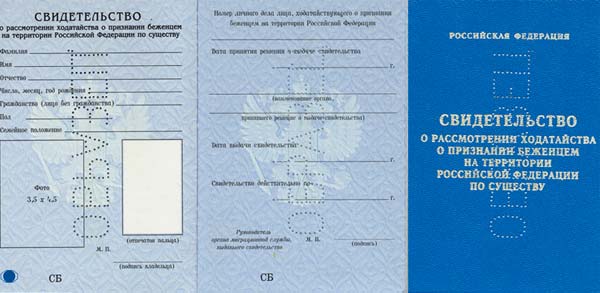
Sample of a refugee certificate in the Russian Federation
Only after this they can move to any other region.
Housing
It is important to understand that the state cannot always provide housing for migrants. The most that Russians who have left Kazakhstan can count on is a room in a family hostel. By the way, even a room is not given out everywhere. Therefore, the housing issue will have to be resolved independently.
Citizenship issue
For Russians who left Kazakhstan, there is a simplified scheme for obtaining citizenship of the Russian Federation. For some, this was the reason for the early move. According to the program, citizenship is issued within three to four months.
To Russia for permanent residence: pitfalls
“There are rumors that the Kazakh authorities, dissatisfied with the outflow of population from the northern and eastern regions of the Republic of Kazakhstan, turned to Vladimir Putin back in the spring with a request to “resolve this issue.” This is precisely why many explain the slowdown in the work of temporary groups of the Federal Migration Service of the Russian Federation, and therefore they prefer to arrange departure through the migration police, becoming participants in the Program already on the territory of Russia.
Our respondent, who wished to remain anonymous:
“These rumors have a very real basis; I personally read on mail.ru complaints against the Kremlin regarding the expansion of the activities of temporary working groups of the Federal Migration Service of Russia on the territory of Kazakhstan and the requirement to take measures to assist in reducing the outflow of the Russian-speaking population from the northern and eastern regions. Putin promised to look into this problem, however, this news only hung for a couple of days and somehow quietly disappeared from mail.ru, but it seems that he is keeping his word. You correctly noted that those leaving under the “Compatriots” program make this journey bypassing the migration police, but there is also an option, so to speak, the other way around. If you have already chosen a particular region and know that it is a potential participant in the program, but is temporarily not involved in the admission work, then you can go there with confidence. There, at your place of stay, you must register for a temporary residence permit, and when the region is included in the program, at the local FMS office you are registered as its participant.”
According to the deputy chairman of the Lad RSD, Pyotr Kuzmenko, there is no opposition to the departure of Program participants from the Kazakh authorities, and no such complaints have been received. And the low productivity of employees of temporary work groups is associated with a shortage of personnel.
It is characteristic that more than 85% of those who have already moved or are just planning to use the Voluntary Resettlement Program, including those who independently moved for permanent residence in Russia, note that the issue of material well-being was not prevalent in their decision to leave. The standard of living, they note, does not differ much in Russia and Kazakhstan. The main motive is the opportunity to fully realize one’s labor and creative potential in Russia, which in Kazakhstan, according to some compatriots, is hampered by clanism and tribalism. And, of course, the psychological factor: that feeling of kinship, belonging to the history, culture and life of Russia, which arises when returning to a Russian-speaking environment.”
North Kazakhstan regional newspaper “Petropavlovsk kz”, 08.08.2013
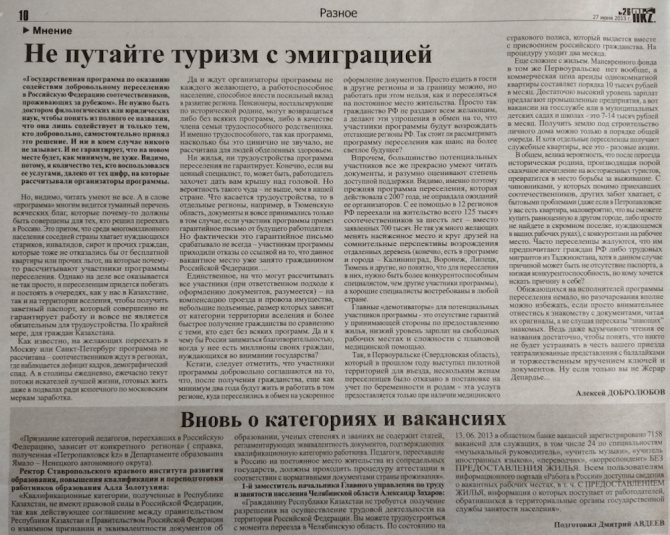
Kurgan: the new program is significantly different from the previous one
“In accordance with the order of the Government of the Russian Federation dated July 24, 2013, the Government of the Kurgan Region reviewed and approved the regional Program on July 29, 2013. The Decree of the Government of the Kurgan Region came into force on August 20, 2013.
The previous targeted Program was focused on a narrow category of specialties - mainly doctors and teachers. The new regional Program differs significantly from the previously existing one. The validity period has increased: it is designed for 2013-2020, but, in essence, the State Program determines the indefiniteness of the organization of work to facilitate the resettlement of compatriots living abroad to the territory of the Russian Federation.
The changes affected the territories of settlement. If the previous Program provided for only seven - these are the regions bordering Kazakhstan, then the new one envisages the entire Kurgan region and Kurgan as the territory of settlement.
The program envisages accepting more than 600 compatriots by 2021, including family members of 1,500 people. Russian legislation also provides for participants and members of their families to obtain a temporary residence permit without taking into account the quota and to acquire Russian citizenship in a simplified manner. And in addition - additional guarantees and social support measures in the form of a one-time settlement allowance in the amount of 15,000 rubles, as well as compensation for expenses of Program participants and their family members for re-certification of academic degrees, nostrification of diplomas and other educational documents in the amount of 3,000 rubles.”
Deputy Head of the Federal Migration Service for the Kurgan Region Dmitry Pristavkin
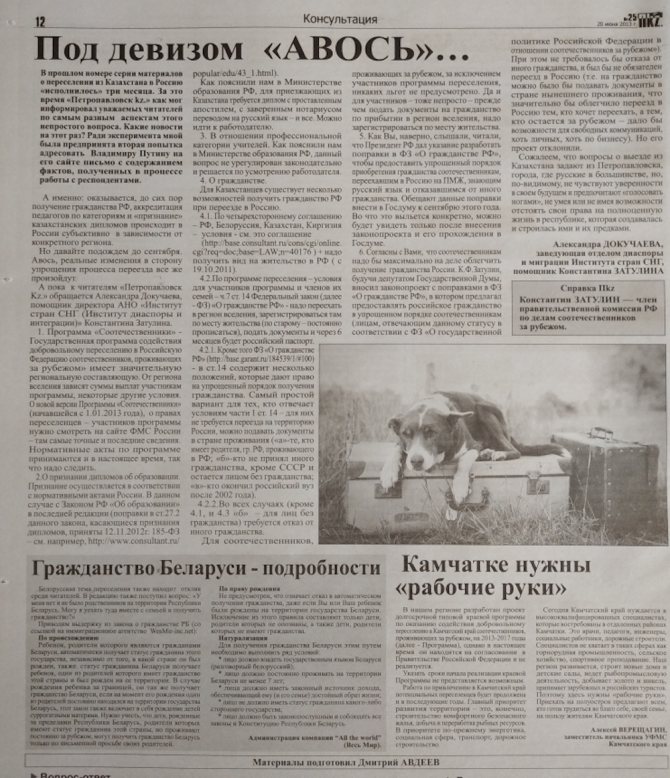
Novosibirsk: the fixation rate is almost 100%
“In the new Resettlement Program for 2013-2020. The entire region is now being considered as a territory for relocation, and not just Novosibirsk, as was the case before. With a program target of 4,000 people, more than 6.2 thousand came to the region, which, without a doubt, is an indicator of the popularity and demand for this territory of settlement. At the same time, out of 6.2 thousand, only 16 people returned to where they left.
This rate of employment was achieved thanks to the well-established work of the support and employment assistance service - arriving compatriots were met and provided with temporary accommodation in a hotel or rented housing at their request (nobody personally met me in 2018 and did not provide temporary housing - author's note) .). But even so, employment and housing are still the most basic issues..."
Minister of Labor, Employment and Human Resources of the Novosibirsk Region Igor Shmidt
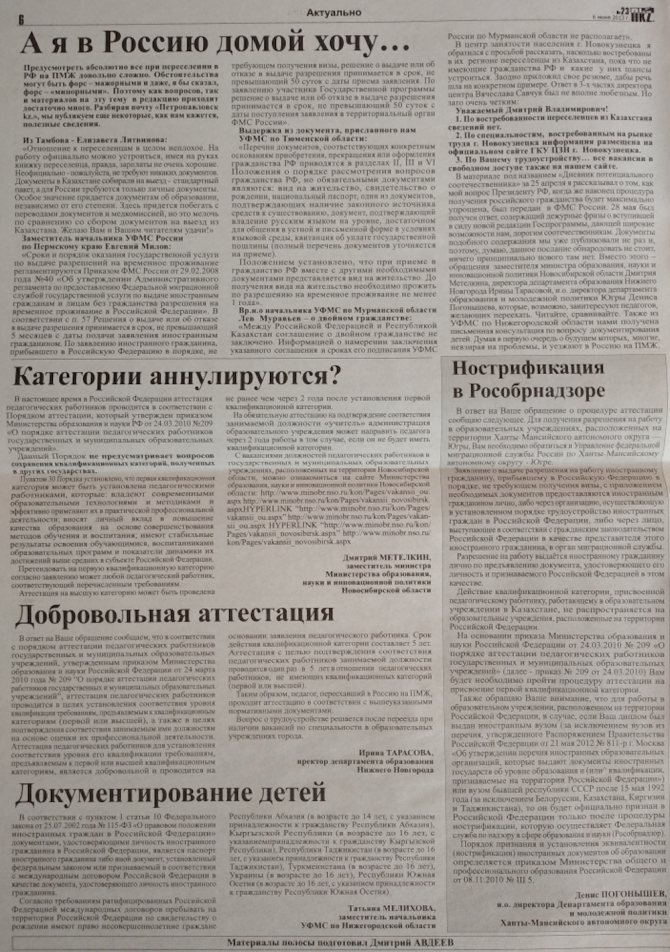
Nizhny Novgorod: procedure agreed
“The scope of the new Program has expanded to thirteen municipalities (compared to four in 2010-2011 and one in 2012). The planned number of Program participants, together with family members, is 1,640 people over the three years of its implementation, which is 1.5 times more than the previous Program.
In addition to the one-time federal benefit, measures of social support are provided at the expense of the regional budget in the form of one-time assistance in the amount of 5,000 rubles per head of the family and 2,000 rubles for each family member included in the certificate and arriving in the resettlement territory.”
Deputy Head of the Federal Migration Service for the Nizhny Novgorod Region Tatyana Melikhova
Ulyanovsk region: adoption of the program is only planned
“For compatriots living abroad and wishing to become participants in the State Program, when moving to the Russian Federation, they do not need to confirm their means of subsistence, including funds in bank accounts. In addition, the Decree of the Government of the Russian Federation dated March 27, 2013 provides for payments to participants of the State Program and members of their families.
Currently, in the Ulyanovsk region it is only planned to adopt a regional program in 2013 and its implementation from 2014.”
Deputy Head of the Federal Migration Service of the Ulyanovsk Region Tatyana Fedina
North Kazakhstan regional newspaper “Petropavlovsk kz”, 09/26/2013
Those who didn't read to the end
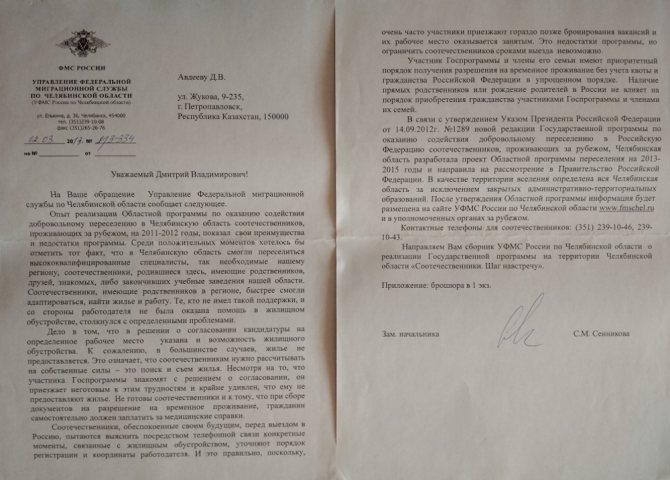
I left for permanent residence in Chelyabinsk in 2019, but I began to be interested in the Southern Urals as a region for possible resettlement in the same 2013 - and therefore, at my personal request and at the request of readers, I requested the relevant information. Documents sent to the editor, as well as excerpts from the brochure “Compatriots. A step towards" are offered to your attention in their original form.
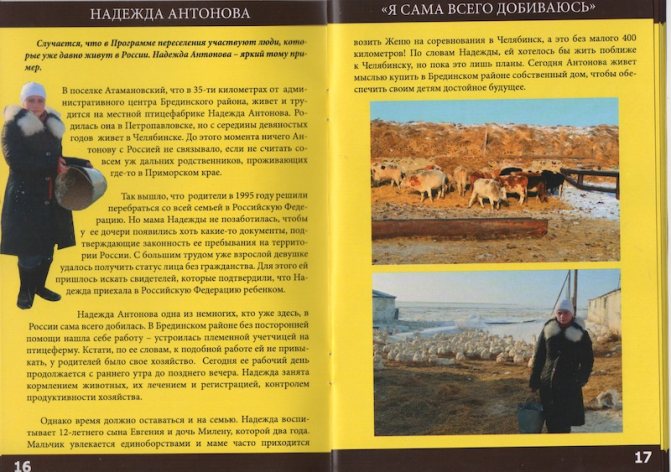
From the brochure “Compatriots. Step forward"
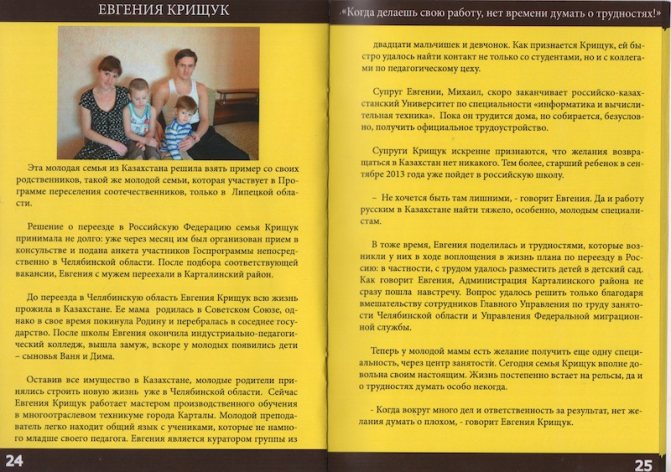
From the brochure “Compatriots. Step forward"
Design nuances
After the region has been selected, or if this is not important, you need to contact the Russian embassy with a question about the easiest way to register Participation in the program. At this stage, a certain package of documents will be generated, which includes:
- application, and from the new year it is necessary to submit an application both in printed and electronic form;
- passport of a citizen of Kazakhstan and a copy certified by a notary;
- as well as a number of future documents, a complete list of documents for the resettlement program to Russia from Kazakhstan can be viewed on the website of the migration service. They are updated occasionally, so up-to-date information will always be presented on the web portal.
